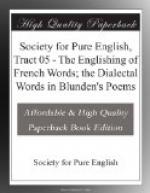’But no one loves the
aguish mist
That writhes its way
at eventide
Along the copse’s
waterside’. (3)
’But now the sower’s hand
is writhed
In livid death ’.
(25)
’To-morrow’s brindled shouting
storms with flood
The purblind hollows with a leaden
rain
And flat the gleaning-fields to
choking mud
And writhe the groaning woods with
bursts of pain’. (42)
’The lispering aspens and the scarfed
brook-grasses
With wakened melancholy writhe the
air’. (53)
#Dimpling# is well and poetically used in
’While the woodlark’s dimpling
rings
In the dim air climb’.
(21)
and also quag (verb) (2), seething (3), channelled (9), bunch (11), jungled (11), rout (verb) (12), fluster (13), byre (13), plash (shallow water) (19), tantalise (neut. v.) (36), hutched (43), flounce (44), rootle (45), shore (verb) (59). Lair (verb) (43) does not seem a useful word.
Next, words somewhat obscurely or fancifully used are starving (1), stark (10), honeycomb (15), cobbled (of pattens) (16), lanterned (24), well (49), bergomask (for village country dances?) (25), belvedere (of the spider’s watch tower) (26).
While the following seem to us incorrectly used: mumbling (23) used of wings; the word is confined to the mouth whether as a manner of eating or of speaking: crunch (28) where the frosts crunch the grass: whereas they only make it crunchable. maligns (54) used as a neuter verb without precedent, chinked (58) of light passing through a chink: and note the homophone chink, used of sound. And then the line
‘The blackthorns clung with heapen sloes’ (55)
contains two reprehensible liberties, because clung in its original proper sense means congealed or shrivelled; to cling was an intransitive verb meaning to adhere together: its modern use is to stick fast [to something]—and secondly, heapen is not a grammatical form; the p.p. is heaped.
Again, in the line
‘He well may come with baits and trolls’, (11)
we do not know whether trolls has something to do with pike-fishing, or merely means the reel on the rod. In that sense it lacks authority(?), moreover it is a homophone, used by our poet in
‘And trolls and pixies unbeknown’. (18)
Finally, there are a good many English country names for common plants, for example, Esau’s-hands, Rabbits’-meat, Bee’s balsams, Pepper-gourds, Brandy-flowers, Flannel-weed, and Shepherd’s rose; and some of these are excellent, and we very much wish that more of our good English plant-names could be distinctively attached.




